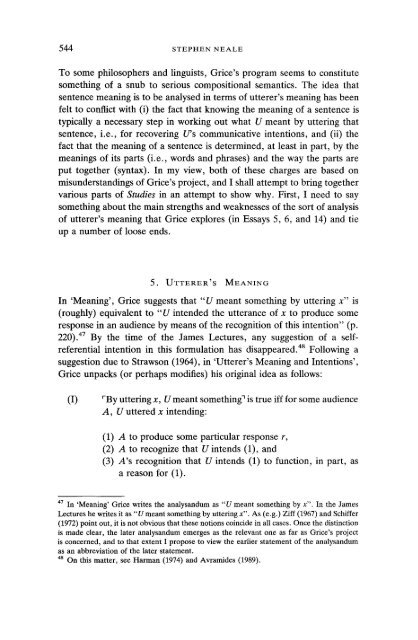Paul Grice and the philosophy of language
Paul Grice and the philosophy of language
Paul Grice and the philosophy of language
Create successful ePaper yourself
Turn your PDF publications into a flip-book with our unique Google optimized e-Paper software.
544 STEPHEN NEALE<br />
To some philosophers <strong>and</strong> linguists, <strong>Grice</strong>'s program seems to constitute<br />
something <strong>of</strong> a snub to serious compositional semantics. The idea that<br />
sentence meaning is to be analysed in terms <strong>of</strong> utterer's meaning has been<br />
felt to conflict with (i) <strong>the</strong> fact that knowing <strong>the</strong> meaning <strong>of</strong> a sentence is<br />
typically a necessary step in working out what U meant by uttering that<br />
sentence, i.e., for recovering U's communicative intentions, <strong>and</strong> (ii) <strong>the</strong><br />
fact that <strong>the</strong> meaning <strong>of</strong> a sentence is determined, at least in part, by <strong>the</strong><br />
meanings <strong>of</strong> its parts (i.e., words <strong>and</strong> phrases) <strong>and</strong> <strong>the</strong> way <strong>the</strong> parts are<br />
put toge<strong>the</strong>r (syntax). In my view, both <strong>of</strong> <strong>the</strong>se charges are based on<br />
misunderst<strong>and</strong>ings <strong>of</strong> <strong>Grice</strong>'s project, <strong>and</strong> I shall attempt to bring toge<strong>the</strong>r<br />
various parts <strong>of</strong> Studies in an attempt to show why. First, I need to say<br />
something about <strong>the</strong> main strengths <strong>and</strong> weaknesses <strong>of</strong> <strong>the</strong> sort <strong>of</strong> analysis<br />
<strong>of</strong> utterer's meaning that <strong>Grice</strong> explores (in Essays 5, 6, <strong>and</strong> 14) <strong>and</strong> tie<br />
up a number <strong>of</strong> loose ends.<br />
5. UTTERER'S MEANING<br />
In 'Meaning', <strong>Grice</strong> suggests that "U meant something by uttering x" is<br />
(roughly) equivalent to "U intended <strong>the</strong> utterance <strong>of</strong> x to produce some<br />
response in an audience by means <strong>of</strong> <strong>the</strong> recognition <strong>of</strong> this intention" (p.<br />
220). 47 By <strong>the</strong> time <strong>of</strong> <strong>the</strong> James Lectures, any suggestion <strong>of</strong> a selfreferential<br />
intention in this formulation has disappeared, as Following a<br />
suggestion due to Strawson (1964), in 'Utterer's Meaning <strong>and</strong> Intentions',<br />
<strong>Grice</strong> unpacks (or perhaps modifies) his original idea as follows:<br />
(I)<br />
rBy uttering x, U meant something" is true iff for some audience<br />
A, U uttered x intending:<br />
(1) A to produce some particular response r,<br />
(2) A to recognize that U intends (1), <strong>and</strong><br />
(3) A's recognition that U intends (1) to function, in part, as<br />
a reason for (1).<br />
47 In 'Meaning' <strong>Grice</strong> writes <strong>the</strong> analys<strong>and</strong>um as "U meant something by x". In <strong>the</strong> James<br />
Lectures he writes it as"U meant something by uttering x". As (e.g.) Ziff (1967) <strong>and</strong> Schiffer<br />
(1972) point out, it is not obvious that <strong>the</strong>se notions coincide in all cases. Once <strong>the</strong> distinction<br />
is made clear, <strong>the</strong> later analys<strong>and</strong>um emerges as <strong>the</strong> relevant one as far as <strong>Grice</strong>'s project<br />
is concerned, <strong>and</strong> to that extent I propose to view <strong>the</strong> earlier statement <strong>of</strong> <strong>the</strong> analys<strong>and</strong>um<br />
as an abbreviation <strong>of</strong> <strong>the</strong> later statement.<br />
48 On this matter, see Harman (1974) <strong>and</strong> Avramides (1989).














